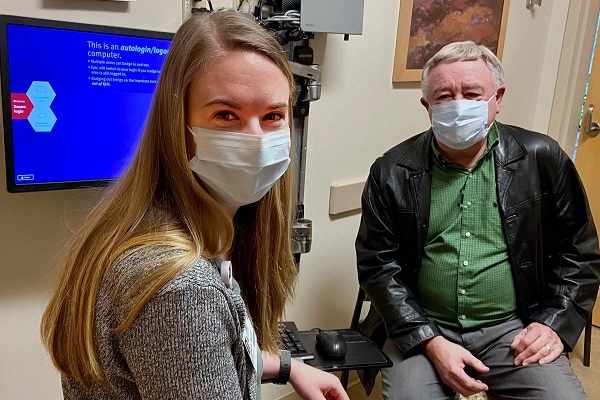Take a lot of meds? Management program could be the answer

Jack's story: From skeptic to fan
Jack Graham approaches his health and prescriptions with the sharp scrutiny of an attorney practicing law for 50 years.
The 77-year-old is not an easy patient – but for good reason. With a family history of high blood pressure, he’s had a long affair with medications. In addition, a ringworm diagnosis years ago turned out instead to be a rare reaction to his blood pressure medication. It took months to figure out, and he almost died.
“I ask a lot of questions now,” he said.
He still needs blood pressure and diabetes meds, and by 2020, Jack was up to four prescriptions. When he visited nurse practitioner Lynn West a few months ago, she referred him to Salem Health’s new Medication Management Clinic.
He met someone there with the time to sort things out — and earn his trust.
“I was skeptical when I first met her,” he said, referring to clinical pharmacist Lindsey Bartos. “But she spent more time with me than anyone had. She reviewed all my tests, respected my need for facts and researched all my questions. She became my advocate.”
Clinical pharmacists specialize in knowing how medications interact so they can tailor prescriptions to a patient’s unique needs. “Jack’s a smart guy,” Bartos laughed. “He’s serious about his health, so it’s a team effort between the both of us. As outpatient clinical pharmacists, we’re fortunate to have the time to sit and talk with patients about their medications. I think this gave us the opportunity to figure out the best regimen for Jack.”
Today, Jack is down to two prescriptions — and “perfect scores.” Dr. Bartos consults with Jack every few months. “It took me four visits to trust her, but I know a good analytical brain when I see one — in fact, I’d hire her for my law practice in a minute!”
New clinical pharmacy fills care gap
The needs are obvious. People with chronic diseases struggle to sort through their overwhelming combination of meds and supplements; providers face more challenging cases (even before the pandemic) with less time to spend — while patients often wait weeks for appointments.
This is where Salem Health’s Medication Management Clinic steps in.
The clinic’s focus is to help patients manage their chronic diseases by paring them with clinical pharmacists. These pharmacists are jumping to the front line, joining other providers in direct care — not just filling prescriptions.
Big success after first year
After one year, the clinic’s results are remarkable. Jack’s story is just one of many.
The clinic launched by asking providers to refer their most challenging diabetes cases (those finding it difficult to keep their A1c below 9%). The idea is to spend more time helping patients who need more follow-up to manage medications.
After the first year, 77% of referred patients improved their A1c to under 9%, and 52% achieve a more clinically meaningful improvement to an A1c of 7 to 8%.
“This is a huge accomplishment,” said Dr. Andrew Sowles, clinic manager. “When people have an A1c over 9 percent, the risk greatly increases for serious risks like heart attack, stroke and, kidney disease.”
Why is the clinic unique?
Pharmacists in an outpatient clinical setting is a novel idea. Salem Health’s Medication Management Clinic is the first and only pharmacist-run clinic in our area. Clinical pharmacists practicing in this setting account for less than 1% of licensed pharmacists in the U.S.
How the clinic works
Patients need a referral from their primary care provider. The clinic matches them with a pharmacist, who becomes their “go-to” person for questions about medications. Connecting is easy — patients can meet with their pharmacist at traditional office visits or from home with telephone or online video visits. They can also reach out with questions via MyChart.